Interview with Tracy Pitcox in Brady, TX, 2011
©
2011 / Bruno Michel;
Fotos Bruno Michel
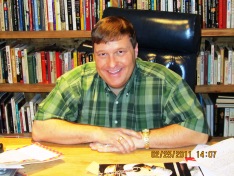 Tracy Pitcox is one of the leading characters in the Lone Star State when it comes to keeping Traditional Country Music alive. In March
Tracy Pitcox is one of the leading characters in the Lone Star State when it comes to keeping Traditional Country Music alive. In March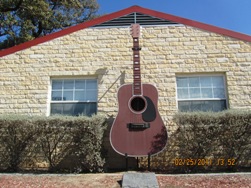 2011, he and his crew celebrated the 22nd Anniversary of the “Heart of Texas Country Music Association”, the “roof” of various organizations and businesses which Tracy is spearheading to promote Traditional Country Music.
2011, he and his crew celebrated the 22nd Anniversary of the “Heart of Texas Country Music Association”, the “roof” of various organizations and businesses which Tracy is spearheading to promote Traditional Country Music.
Since more than 25 years, Tracy has his own radio show on KNEL, a local station from Brady, TX. The “Hillbilly Hits Radio Show” reaches out every Thursday and Saturday from 6pm to 10pm CT. You can listen to the program on http://www.knelradio.com.
The show allowed him to invite many co-hosts over the years. Their names read like a who-is-who in Country Music: Kitty Wells, Charlie Louvin, Hank Locklin – just to name a few. He also took every opportunity to interview dozens of Country Superstars like George Jones or Loretta Lynn and has penned these talks in a book called “Legendary Conversations With A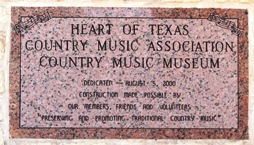 Texas Disc Jockey” (ISBN # 978-1-4276-1799-6).
Texas Disc Jockey” (ISBN # 978-1-4276-1799-6).
Tracy’s record label, “Heart Of Texas Records”, has created an outlet channel for such great artists like Frankie Miller, Ferlin Husky, Darrell McCall, Curtis Potter or Tony Booth. The label also promotes 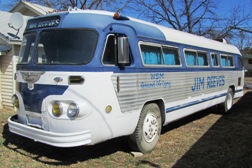 successful artists of the next generation, like Amber Digby or Justin Trevino. Trevino, a gifted singer, songwriter and musician himself, acts as the main producer of all records published from their artist roster.
successful artists of the next generation, like Amber Digby or Justin Trevino. Trevino, a gifted singer, songwriter and musician himself, acts as the main producer of all records published from their artist roster.
Being a collector of personal items that once belonged to Country Superstars. Tracy Pitcox developed a noteworthy collection over the years. Whenever one of these greats played near his hometown, he was looking for memorabilia. He once bought a dress from Rose Maddox for $100 and still insists that those were the best $100 he ever spent in his 40 years of life. Over time, these items lead to the idea of creating the “Heart Of Texas Country Music Museum”, which is located in Brady, TX, and has opened it’s doors in 2000. More than 75 artists have contributed to the displays and they are constantly expanding the premises.
Tracy is a restless character, always on the look for new ventures and opportunities. He promotes his label acts and other legendary artists on various Country Oprys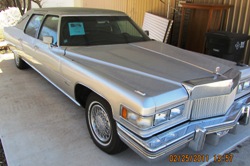 in Llano, Mason and Marble Falls. Furthermore, he arranges sea cruises with a leading travel agency, where his artists entertain the travelers during the entire cruise. He’s also hosting bus tours to Branson, MO or Nashville, TN on a regular basis. Tracy Pitcox is a true asset to Texas Country Music in particular and Traditional Country Music in general. It’s people like him that make sure, these sounds will never be forgotten. Here’s what he had to say.
in Llano, Mason and Marble Falls. Furthermore, he arranges sea cruises with a leading travel agency, where his artists entertain the travelers during the entire cruise. He’s also hosting bus tours to Branson, MO or Nashville, TN on a regular basis. Tracy Pitcox is a true asset to Texas Country Music in particular and Traditional Country Music in general. It’s people like him that make sure, these sounds will never be forgotten. Here’s what he had to say.
BM: Tracy, you’re Label President, Museum Director, Tour- and Artist manager, Book Author. I also read, that at one time you offered Wedding arrangements. Where do you find the time to coordinate all this work.
TP: (laughs). I used to DJ at weddings. Things kind of evolved. Even when I was a kid, I used to stay up and listen to late night radio. DJs like Bill Mack and Larry Scott would play requests and I was a frequent caller. When I was 15 I got my first job at the radio station here in Brady. Then I interviewed some of the artists I played during my show which lead to me bringing some of these acts to town for live performances. It’s not like I had a plan twenty years ago that I wanted to do things in a certain logical sequence. One little enterprise led to the next little enterprise and here we are today.
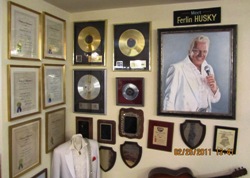 BM: Many of our beloved traditional artists have already passed away. Looking at examples like Amber Digby or Justin Trevino leads me to think that there are far more passings than newcomers in this segment. “Who’s Gonna Fill Their Shoes” in your opinion?
BM: Many of our beloved traditional artists have already passed away. Looking at examples like Amber Digby or Justin Trevino leads me to think that there are far more passings than newcomers in this segment. “Who’s Gonna Fill Their Shoes” in your opinion?
TP: That’s a really good question. We’re never gonna have another Kitty Wells, Ernest Tubb or Hank Thompson in my opinion. The future of Traditional Country Music is debated so much these days. But there are still young people out there doing it. I have a real problem with people grumping about the demise of Traditional Country Music, Instead they should look forward and be thankful that we have artists like Amber Digby, Justin Trevino, Jake Hooker or Bobby Flores and some of these guys that keep our beloved music alive.
BM: But isn’t it sad that these days artists have to sell 500’000 copies of a record to keep their major label contract? That’s why we appreciate what labels like yours are doing for these artists.
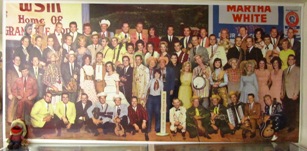 TP: We’ve proven that you can actually make money without selling these numbers. It can be done. I remember Ernest Tubb’s last few records, where he was selling in the five to fifteen thousands. And he was one of the greatest artists ever. Today they wouldn’t have a chance on major labels. I consider it as the job of the label to fund an artist’s recording session and then hoping that the product would sell with the right promotion. That’s how “Heart of Texas Records” works. Once we’ve paid for one artist’s session, we put the remaining money back into the next artist’s session.
TP: We’ve proven that you can actually make money without selling these numbers. It can be done. I remember Ernest Tubb’s last few records, where he was selling in the five to fifteen thousands. And he was one of the greatest artists ever. Today they wouldn’t have a chance on major labels. I consider it as the job of the label to fund an artist’s recording session and then hoping that the product would sell with the right promotion. That’s how “Heart of Texas Records” works. Once we’ve paid for one artist’s session, we put the remaining money back into the next artist’s session.
BM: What, if anything, would you do different if you could restart your career from those first days at KNEL?
TP: I don’t know if I would do anything different. Of course I made mistakes, that’s part of the learning process. I never forget booking my first major show. I was 18 years old and booked Kitty Wells and Johnny Wright at the Brady Highschool Auditorium. I put some posters and ad’s out and thought these names would draw enough audience to pay for the gig. Well, I had to borrow $500 from my dad to pay them because it didn’t quite work that way. The next morning I picked them up for breakfast and Johnny said: “Tracy, this was your first time booking a show?”. I said “Yes Sir.” He knew it and he said: “Kitty and I talked this through. If you get a chance, book us again” and he handed me my check back. I booked them many times after that. I’ve learnt my lesson and I always have a soft spot in my heart for 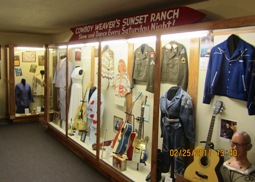 them.
them.
BM: Doing a 3-4 hour show for 25 years means you played approx. 55’000-60’000 songs during all these years. This tends to become routine work. How do you keep things alive during a show.
TP: I try to let the listeners decide what to play. Of course, some songs kind of “wear out” over time and you got to pick some others. But let the listeners be in control and then spice that up with some interviews and other things.
BM: You’re currently staffing Country Oprys of Marble Falls, Mason and Llano. We’ve attended many of these shows and they were almost all sold-out. Are there any more projects cooking?
TP: I would probably have to find another wife if I did that. She thinks I pretty much maxed it out. Llano is our biggest Opry and it’s almost always sold out every month. Marble Falls is not too far behind and then there’s Mason. It’s a smaller theater but I still love this venue because it’s where we first started at. They’re restoring a theater here in Brady and my hope is that we also can do more things here locally.
BM: What would Tracy Pitcox do today, if he wasn’t in the Media/Artist Business?
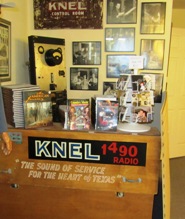 TP: My first job ever was watering cemetery lots. I was eleven years old. I helped an elderly gentlemen and wound up getting his business when he retired and I was thirteen. I got $2 for each lot with 30 lots to water each week. Later I got $3 per lot. So if I wasn’t in Radio, I’d probably be in the cemetery business (laughs).
TP: My first job ever was watering cemetery lots. I was eleven years old. I helped an elderly gentlemen and wound up getting his business when he retired and I was thirteen. I got $2 for each lot with 30 lots to water each week. Later I got $3 per lot. So if I wasn’t in Radio, I’d probably be in the cemetery business (laughs).
BM: I have done many interviews myself and sometimes it takes a while to collect meaningful questions. How do you select topics you want to ask an artist?
TP: I try to ask them something that they’ve probably never been asked. I remember Charley Pride, who told me that he got really tired of always being asked how he feels about being the first black country music entertainer. And that he doesn’t really care to answer that anymore. I can’t blame him for that, so I always try to find something that is a little special to them. And I read a lot of other people’s interviews.
BM: What was the most memorable moment you had during your many artist encounters?
TP: There’s been a lot of really special moments. What makes me feel good is that I can talk to these people and they know who I am when I call them. I remember 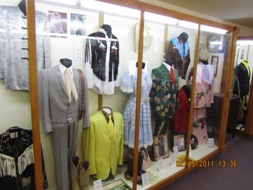 Ferlin Husky when we were working in Wisconsin. He’d been signing autographs for well over an hour and he got physically tired. He said “Tracy, I got to go”. I said: “How do you want to do this, there’s so many people”. He said: Just grab my hand and lead me out.” So I did. And, of course, people were not pleased and tried to hold us back. And Ferlin Husky, in his white suit, that great 83-year old man, said: “I got the diarrhea, I got to go.” You would not imagine how quick we were able to get out. That’s one of the funny moments.
Ferlin Husky when we were working in Wisconsin. He’d been signing autographs for well over an hour and he got physically tired. He said “Tracy, I got to go”. I said: “How do you want to do this, there’s so many people”. He said: Just grab my hand and lead me out.” So I did. And, of course, people were not pleased and tried to hold us back. And Ferlin Husky, in his white suit, that great 83-year old man, said: “I got the diarrhea, I got to go.” You would not imagine how quick we were able to get out. That’s one of the funny moments.
BM: The format you are supporting has a lot of fans in Europe. What about a project that would bring all these fine artists on a European Tour?
TP: You know I’d love that. We’ve been to Ireland several times with Leona Williams, Georgette Jones and Billie Jo Spears. This year we’ll go to Scotland with some other artists….
BM: …I’m more thinking of mainland Europe. It’s different, especially regarding food…
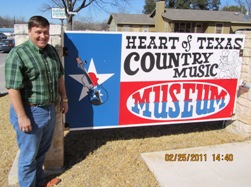 TP: ...That would be great. I have some artists that would be willing to go there. Ferlin told me that he’d love to go back and visit the fans. Of course, he wouldn’t travel anymore these days but people like Tony Booth sure would.
TP: ...That would be great. I have some artists that would be willing to go there. Ferlin told me that he’d love to go back and visit the fans. Of course, he wouldn’t travel anymore these days but people like Tony Booth sure would.
BM: If you were to interview Tracy Pitcox, which question would you ask him, that I did not?
TP: That’s a tough one. I guess I’d ask myself… why I’m sitting here wondering what I would ask myself (laughs). I’d probably ask why we’ve done what we’ve done. It’s because of the people that come to the museum, the recording studio and to our shows. We may never meet but they may put on a “Heart of Texas” CD some time and enjoy the music. And hopefully in fifty or seventy years from now some people would still be listening to these records.
BM: Thank you very much for the interview.
 Tracy Pitcox is one of the leading characters in the Lone Star State when it comes to keeping Traditional Country Music alive. In March
Tracy Pitcox is one of the leading characters in the Lone Star State when it comes to keeping Traditional Country Music alive. In March 2011, he and his crew celebrated the 22nd Anniversary of the “Heart of Texas Country Music Association”, the “roof” of various organizations and businesses which Tracy is spearheading to promote Traditional Country Music.
2011, he and his crew celebrated the 22nd Anniversary of the “Heart of Texas Country Music Association”, the “roof” of various organizations and businesses which Tracy is spearheading to promote Traditional Country Music. Texas Disc Jockey” (ISBN # 978-1-4276-1799-6).
Texas Disc Jockey” (ISBN # 978-1-4276-1799-6). successful artists of the next generation, like Amber Digby or Justin Trevino. Trevino, a gifted singer, songwriter and musician himself, acts as the main producer of all records published from their artist roster.
successful artists of the next generation, like Amber Digby or Justin Trevino. Trevino, a gifted singer, songwriter and musician himself, acts as the main producer of all records published from their artist roster. in Llano, Mason and Marble Falls. Furthermore, he arranges sea cruises with a leading travel agency, where his artists entertain the travelers during the entire cruise. He’s also hosting bus tours to Branson, MO or Nashville, TN on a regular basis. Tracy Pitcox is a true asset to Texas Country Music in particular and Traditional Country Music in general. It’s people like him that make sure, these sounds will never be forgotten. Here’s what he had to say.
in Llano, Mason and Marble Falls. Furthermore, he arranges sea cruises with a leading travel agency, where his artists entertain the travelers during the entire cruise. He’s also hosting bus tours to Branson, MO or Nashville, TN on a regular basis. Tracy Pitcox is a true asset to Texas Country Music in particular and Traditional Country Music in general. It’s people like him that make sure, these sounds will never be forgotten. Here’s what he had to say. BM: Many of our beloved traditional artists have already passed away. Looking at examples like Amber Digby or Justin Trevino leads me to think that there are far more passings than newcomers in this segment. “Who’s Gonna Fill Their Shoes” in your opinion?
BM: Many of our beloved traditional artists have already passed away. Looking at examples like Amber Digby or Justin Trevino leads me to think that there are far more passings than newcomers in this segment. “Who’s Gonna Fill Their Shoes” in your opinion? TP: We’ve proven that you can actually make money without selling these numbers. It can be done. I remember Ernest Tubb’s last few records, where he was selling in the five to fifteen thousands. And he was one of the greatest artists ever. Today they wouldn’t have a chance on major labels. I consider it as the job of the label to fund an artist’s recording session and then hoping that the product would sell with the right promotion. That’s how “Heart of Texas Records” works. Once we’ve paid for one artist’s session, we put the remaining money back into the next artist’s session.
TP: We’ve proven that you can actually make money without selling these numbers. It can be done. I remember Ernest Tubb’s last few records, where he was selling in the five to fifteen thousands. And he was one of the greatest artists ever. Today they wouldn’t have a chance on major labels. I consider it as the job of the label to fund an artist’s recording session and then hoping that the product would sell with the right promotion. That’s how “Heart of Texas Records” works. Once we’ve paid for one artist’s session, we put the remaining money back into the next artist’s session. them.
them. TP: My first job ever was watering cemetery lots. I was eleven years old. I helped an elderly gentlemen and wound up getting his business when he retired and I was thirteen. I got $2 for each lot with 30 lots to water each week. Later I got $3 per lot. So if I wasn’t in Radio, I’d probably be in the cemetery business (laughs).
TP: My first job ever was watering cemetery lots. I was eleven years old. I helped an elderly gentlemen and wound up getting his business when he retired and I was thirteen. I got $2 for each lot with 30 lots to water each week. Later I got $3 per lot. So if I wasn’t in Radio, I’d probably be in the cemetery business (laughs). Ferlin Husky when we were working in Wisconsin. He’d been signing autographs for well over an hour and he got physically tired. He said “Tracy, I got to go”. I said: “How do you want to do this, there’s so many people”. He said: Just grab my hand and lead me out.” So I did. And, of course, people were not pleased and tried to hold us back. And Ferlin Husky, in his white suit, that great 83-year old man, said: “I got the diarrhea, I got to go.” You would not imagine how quick we were able to get out. That’s one of the funny moments.
Ferlin Husky when we were working in Wisconsin. He’d been signing autographs for well over an hour and he got physically tired. He said “Tracy, I got to go”. I said: “How do you want to do this, there’s so many people”. He said: Just grab my hand and lead me out.” So I did. And, of course, people were not pleased and tried to hold us back. And Ferlin Husky, in his white suit, that great 83-year old man, said: “I got the diarrhea, I got to go.” You would not imagine how quick we were able to get out. That’s one of the funny moments. TP: ...That would be great. I have some artists that would be willing to go there. Ferlin told me that he’d love to go back and visit the fans. Of course, he wouldn’t travel anymore these days but people like Tony Booth sure would.
TP: ...That would be great. I have some artists that would be willing to go there. Ferlin told me that he’d love to go back and visit the fans. Of course, he wouldn’t travel anymore these days but people like Tony Booth sure would.